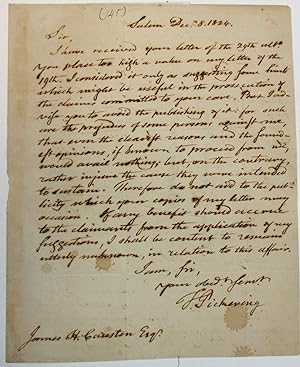About this Item
Bifolium, folded to [4] pp. Letter on first page, interior pages blank, addressed, with Salem postal cancel, to "James H. Causten Esqr. | Baltimore." Old folds, tear without text loss from removing the red seal [a remnant of which remains]. Expert reinforcement on blank verso of portion of top edge. Very Good. Historians have not treated the Federalist Pickering well. He "proved to be malign" in the Administrations of Washington and John Adams [Flexner, Washington The Indispensable Man'325]. "A stony-faced Puritan with hawk eyes" [id.], he was responsible for the removal of Washington's old friend Edmund Randolph as Secretary of State. He succeeded Randolph in that office as "a bitter and uncompromising Federalist. The French Revolution filled him with dread and loathing" [DAB]. Thanks to Garry Wills, however, Pickering's reputation has begun an uptick, particularly for his opposition to Thomas Jefferson's efforts to expand the power of the South and Slavery. See, Wills: Negro President: Jefferson and the Slave Power. [2005]. Causten, a prominent Baltimore lawyer, represented American claimants who had petitioned Congress for indemnity payments arising from French Spoliations during the Quasi-War of 1797-1798. Many of these claims remained unsettled, even in 1824. Causten and Pickering had corresponded on the matter, Pickering evidently having provided advice to Causten. But Pickering was wise enough to realize that he was anathema to many of his contemporaries. This Letter modestly advises Causten that he, Pickering, should be kept in the shadows: "Sir | I have received your letter of the 29th ult. You place too high a value on my letter of the 19th. I considered it only as suggesting some limits which might be useful in the prosecution of the claims committed to your care. But I advise you to avoid the publishing of it: for such are the prejudices of some persons against me, that even the clearest reasons and the soundest opinions, if known to proceed from me, would avail nothing; but, on the contrary, rather injure the cause they were intended to sustain. Therefore do not add to the publicity which your copies of my letter may occasion. If any benefit should accrue to the claimants from the application of my suggestions, I shall be content to remain utterly unknown, in relation to this affair. | I am, Sir, | Your obedt. Servt | T. Pickering.". Seller Inventory # 37797
Contact seller
Report this item
![]()




